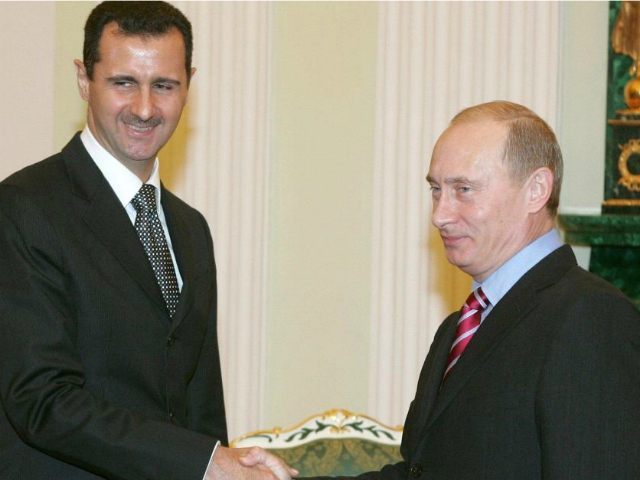The Russian government has announced that it will participate in “peace talks” with the Syrian government and a coalition of the “most influential outside players” in the Syrian Civil War, bringing America, Iran, and Saudi Arabia to the table.
“We have named the participants: Russia, the US, Iran, Saudi Arabia, Turkey and Egypt,” Deputy Foreign Minister Mikhail Bogdanov confirmed on Monday to Russian media outlet RIA Novosti. He noted that Russian authorities were looking for these talks to happen “as soon as possible,” as the Islamic State is gaining ground against the Assad regime in Syria. The talks will allegedly begin after the end of the United Nations General Assembly meeting, though it is not yet certain who, exactly, will be there representing the countries named. “The level hasn’t been decided yet,” Bogdanov noted, though he expected “experts” and “deputy ministers” will be involved, as well as UN Syria envoy Staffan de Mistura.
The United States has been the leading Western voice calling for President Bashar Assad to be removed from power since the civil war started in 2011. Following President Obama’s declaration that a “red line” had been crossed when it was proven that Assad used chemical weapons on civilians, the United States did not act following its condemnation, and Russia slowly became the main international actor in Syria. While a longstanding presence in the region, Russia has greatly expanded its military footprint in Syria within the past month, a move American Secretary of State John Kerry described as “force protection” for the Russian troops. Turkey, arguably the loudest anti-Assad voice in the world, has condemned Russia’s invasion of Syria as “very dangerous.”
Russian President Vladimir Putin reiterated his support for Assad on the American news program 60 Minutes on Sunday. He told interviewer Charlie Rose:
We support the legitimate government of Syria, and it’s my deep belief that any actions to the contrary in order to destroy the legitimate government will create a situation which you can witness now in the other countries of the region or in other regions, for instance in Libya where all the state institutions are disintegrated.
Russia has also expanded its presence in neighboring Iraq, allegedly also to fight the Islamic State terrorist group. The officially recognized Shiite Iraqi government announced on Sunday that it would begin sharing intelligence with Russia, Syria, and Iran. Many critics of Russian expansionism condemn the moves as attempts to use its military to take on roles traditionally belonging to the United States on the international stage to expand its power.
American officials have responded tepidly to Russia’s incursions in the Middle East. “Trust but verify,” Defense Secretary Ashton Carter told reporters when asked whether the United States could trust Russian government officials when reporting on their activity in the Middle East. “It’s not a matter of trust,” he added. “It’s a matter of seeing what the Russians do.” Carter expressed concern that Russia would attack any militia fighting against Assad, regardless of whether they were allied with the Islamic State. The Pentagon has invested in training anti-Assad rebels in the hope that they will fight ISIS, as well as Assad.
During the weekend, the Pentagon confirmed that the latest group of American-trained “moderate” Syrian rebels had defected to the al-Nusra Front, a militia affiliated with al-Qaeda.
Regarding Assad himself staying in power, there appears to be a coming shift in attitudes in the West, with a number of international actors signaling that Assad could take part in a peace agreement. John Kerry said this month he believed that Assad’s “long-term presence” was necessary for peace. German Chancellor Angela Merkel has urged leaders to include Assad in peace talks. The Guardian has reported that UK leaders also see Assad as part of a transition process, though not a transition to a restored Assad government. Even Turkish President Recep Tayyip Erdogan said that a solution to the Syrian Civil War “with Assad” was possible, though he immediately accused anyone quoting him of being “manipulators” and liars.
Turkey appears to be the most vocal outlier in the group Russia has assembled to discuss a transition in Syria. In New York for the United Nations General Assembly meeting, Turkish Prime Minister Ahmet Davutoğlu once again asserted his nation’s demand that Assad not be included in a Syrian transition process. “The only way of establishing the safe zone is by reinforcing the Free Syrian Army [FSA] and the moderate components,” he said on Sunday, “We don’t want to see either Daesh [the Arabic acronym for ISIL], or the Syrian regime on our borders.”
“Would al-Assad’s staying resolve the terror and refugee problems? No,” Davutoğlu concluded.

COMMENTS
Please let us know if you're having issues with commenting.